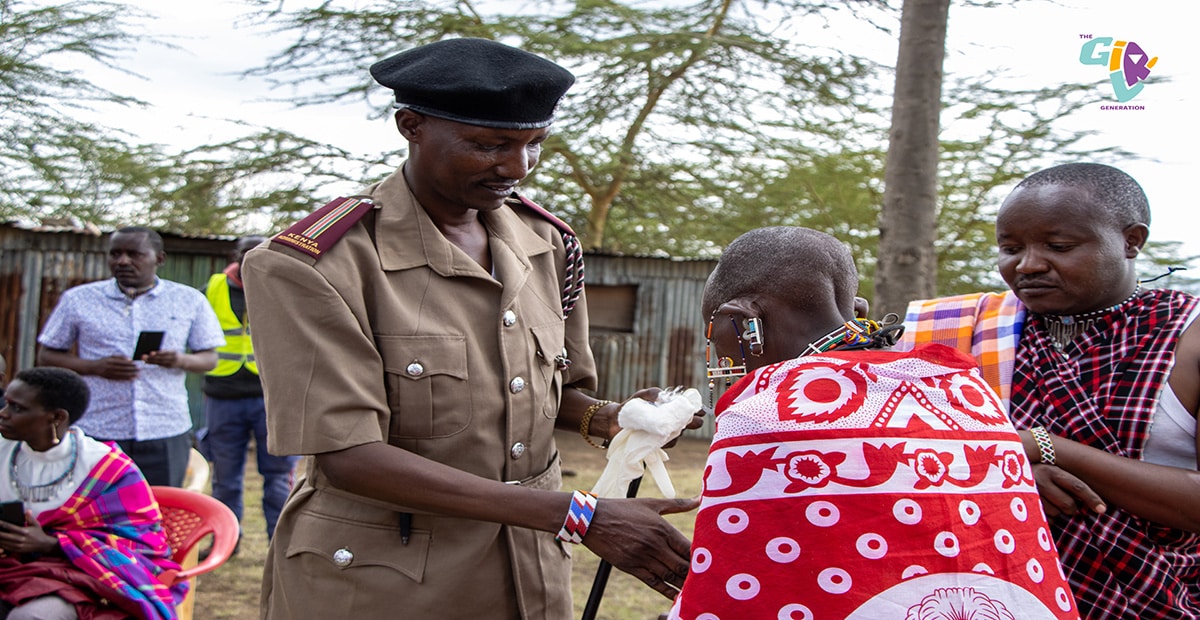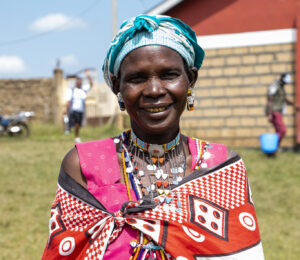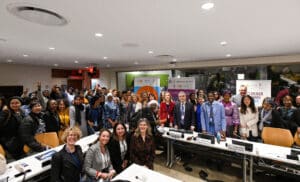Chief Rallies Community to End FGM/C and Child Marriage
Narok County is situated in the southern part of the Great Rift Valley. The Maasai community, a semi-nomadic community, is the predominant community occupying most parts of the county. Girls in the Maasai community are known to undergo Female Genital Mutilation/Cutting (FGM/C) before they are married off from as young as the age of 9 years. The proportion of women aged 15-49 who have undergone FGM/C in Narok County stands at 77.9%. The county also has new worrying emerging trends including, a lowered age of cutting, heightened secrecy, medicalization of FGM/C, adoption of less severe forms of cutting and cross-border cutting (along the Kenya-Tanzanian border).
Dansen Reson, Chief Enosupukia Location-Narok County, receiving tools from a reformed cutter after learning of the harm it had on girls and women.The 2010 Constitution of Kenya (Article 53) recognizes the right of all children to be protected from abuse, neglect, harmful cultural practices, all forms of violence, inhumane treatment and punishment, and hazardous or exploitative labour. In the year 2011, the Kenyan government passed the Prohibition of Female Genital Mutilation Act into law, imposing harsh criminal penalties for cutting. This makes the war against FGM/C a top priority for the Government through her national administration officers.
In Narok East Sub-County, we meet Dansen Saruni Reson, the current Chief Enosupukia Location, Suswa Division spearheading the end-FGM/C initiative. Born and raised in the area to a family with 9 stepmothers, Reson has become a household name and an adversary’ to advocates of FGM/C.
“I appreciate The Girl Generation programme for the opportunity to accelerate the abandonment of FGM/C through implementing a community lead approach that supports community champions to drive change.I strongly believe that sustainable change in ending FGM/C and other harmful traditional practices, must first and foremost come from, and be led by the communities.” Chief Reson concludes.
Through his youth into adulthood, Reson was determined to change his family for the better. He completed his teacher training certificate in 1990 and worked as a primary school teacher in his community where he taught for years rising to the position of headteacher. In 2008, he shifted careers and joined the national government administration as an assistant chief in Enosupukia Sub-location.
His watershed moment came when his sister underwent the cut and he witnessed the pain and trauma she experienced. This gave him the drive to ensure the same pain and trauma is not inflicted on any other girls in his community despite the cultural importance of the practice. He was delighted to learn when The Girl Generation (TGG) project launched its program in Suswa Ward, where he is based.
Through his influence as a local chief and champion against FGM/C, he has supported the project to gain community buy-in and has managed to marshal support from like-minded individuals and families including his own and former cutters to lead the change against the practice in his Eseneto village. “There is still notable resistance from sections of thecommunity, however, the journey towards social normative change has started and there’s no stopping. We as champions are going to rally the community to end-FGM/C and other harmful cultural practices, educate daughters, and treat both girls and boys equally. We will lead by example and inspire the community to change,” explained Reson.
Reson mentions that an effective approach to end FGM/c is in supporting community intergenerational dialogues targeting elders, women, female and male youth; ensuring no one should be left behind. There is need to target individuals, then households and then rally the community to join the fight he tells us. Educating the community on the negatives of the practice, anti-FGM laws and policies as well as consequences for cutters, perpetrators and abettors is critical. “Though there is a growth in medicalization of the practice, we will continue to fight the vice and expose the wrongdoers,” he states.
When asked about how many girls in total he has helped avoid the practice, Reson tells that his home has become as safe space for girls and that they are always welcomed whenever the need calls. His family protects, feeds, counsels and allows the girls to interact with their peers in his homestead as an interim measure. Through these means he suggests that up to 100 girls have avoided the cut. He does however hope that a rescue centre can be established for survivors and girls at risk of abuse in the future. He has suggested that with the increased awareness of the negative effects of FGM/C, the number of girls seeking protection will increase generating a greater need.
Regarding high teenage pregnancies in Narok County, Reson believes transactional sex is a key driver as poor school going girls trade sex with men for essentials such as sanitary towels and food. He also advises youth and parents to prioritize education ahead of marriage despite cultural importance of some practices. This will pay off for all parties in the long term as educated and empowered girls will be able to assist their parents even better.
The local chief acknowledges the importance of administrators in leading the change. “To my fellow administrators, the societal pressure to maintain status quo on harmful traditional practice will always be there. However, we need to stand steadfast and conduct our jobs in adherence to the national laws and policies. There is no need for any girl to undergo the cut. It is a serious human rights abuse, and a form of gender-based violence and child abuse. We need to be at the forefront to inspire change in our Maasai community,” he emphasizes.




